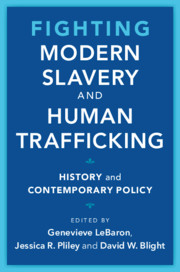Book contents
- Fighting Modern Slavery and Human Trafficking
- Slaveries since Emancipation
- Fighting Modern Slavery and Human Trafficking
- Copyright page
- Contents
- Figures
- Tables
- Contributors
- Preface
- Acknowledgments
- Abbreviations
- 1 Introduction
- 2 Counting Modern Slaves
- 3 Working Analogies
- 4 Free Soil, Free Produce, Free Communities
- 5 Ambivalent Abolitionist Legacies
- 6 Mexico’s New Slavery
- 7 Undermining Labor Power
- 8 A Market in Deception? Ethically Certifying Exploitative Supply Chains
- 9 Preventing Human Trafficking
- 10 Integrated and Indivisible
- Afterword If There Is No Struggle, There Is No Progress
- Index
4 - Free Soil, Free Produce, Free Communities
Published online by Cambridge University Press: 18 June 2021
- Fighting Modern Slavery and Human Trafficking
- Slaveries since Emancipation
- Fighting Modern Slavery and Human Trafficking
- Copyright page
- Contents
- Figures
- Tables
- Contributors
- Preface
- Acknowledgments
- Abbreviations
- 1 Introduction
- 2 Counting Modern Slaves
- 3 Working Analogies
- 4 Free Soil, Free Produce, Free Communities
- 5 Ambivalent Abolitionist Legacies
- 6 Mexico’s New Slavery
- 7 Undermining Labor Power
- 8 A Market in Deception? Ethically Certifying Exploitative Supply Chains
- 9 Preventing Human Trafficking
- 10 Integrated and Indivisible
- Afterword If There Is No Struggle, There Is No Progress
- Index
Summary
This chapter explores the centrality of community organizing to past anti-slavery movements and examines the continuing role for community-based activism, with a focus on the United States and the United Kingdom. The contribution of community mobilization to contemporary antislavery action is often overlooked, with emphasis falling instead on the efforts of legislators, policy-makers, and NGOs. In arguing for a broader perspective we identify the historic role of three "convening" forces - faith, commerce, and place – in drawing individuals together. We argue that such forces played a core role in stimulating changes to existing social and cultural norms and underpinning a developing consensus on the human right to be free from slavery. We assert that such processes of "moral redefinition" start with individuals but are sustained and given momentum by groups – leading by example, suggesting and sharing, working together to express moral choices through considered action. We also find that faith, commerce, and place continue to offer significant convening role for antislavery organizing. The challenge facing community organizers in the present anti-slavery movement is clarifying and naming the diverse social and cultural norms underpinning contemporary forms of exploitation, as well as creating consensus on the best path for decisive action.
- Type
- Chapter
- Information
- Fighting Modern Slavery and Human TraffickingHistory and Contemporary Policy, pp. 73 - 96Publisher: Cambridge University PressPrint publication year: 2021

